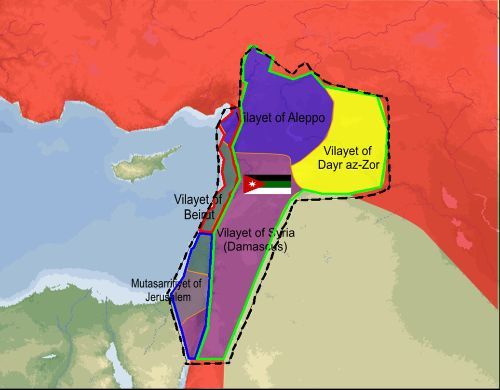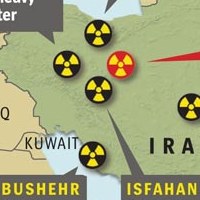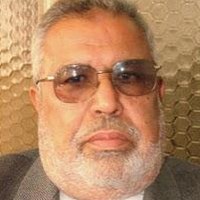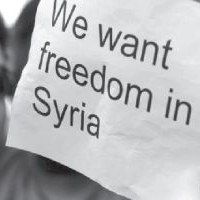![]()
Mon, Dec 09, 2002 | The Toronto Star | by Rosie Dimanno
The spirit of Emir Faisal I
Muslims should embrace the spirit of Emir Faisal I:
“We feel that the Arabs and Jews are cousins in race (and) have suffered similar oppression at the hands of powers stronger than themselves…. We Arabs, especially the educated among us, look with the deepest sympathy on the Zionist movement…. We will wish the Jews a hearty welcome home…. People less informed and less responsible than our leaders and yours, ignoring the need for co-operation of the Arabs and Zionists, have been trying to exploit the local difficulties that must necessarily arise in Palestine in the early stage of our movements.” Emir Faisal I
That’s an Arab speaking, to a Jew. If only such words, and such sentiments, would be expressed today.
Alas, these lines were penned in 1919 by Emir Faisal ibn Hussein, in a letter sent to Felix Frankfurter, head of the American Zionist delegation to the Paris Peace Conference, where the vanquished Ottoman Empire was about to be parceled out among the victors of World War I. The Arabs had been victors too, throwing off the yoke of Turkish misrule. It was Faisal’s valiant desert army, with T.E. Lawrence — Lawrence of Arabia — riding alongside its leaders, that had made possible British victory in the Mideast.
In return, Faisal was sold out in Paris by the predetermined Sykes-Picot agreement that gave Syria to the French. Faisal’s unacknowledged government in Damascus lasted just over a year. But he would go on to become the first king of Iraq and his brother Abdullah first King of Jordan. Faisal’s bloodline and Iran’s constitutional monarchy — which had brought nationhood and independence to the squabbling vilayets of ancient Mesopotamia — would ultimately be overthrown, 17 years after his coronation, his young grandson assassinated, the tribal factions falling back into internecine quarrels, with revolution and coups marking the end of the Hashemite monarchy in Iraq. From that came a military junta and, eventually, the rise of a young officer called Saddam Hussein.
Iraq is now squarely in America’s gunsights. But there was a time when that country was a model of emerging statehood, fledgling democracy and pluralism. Faisal’s first finance minister was a Jew and a strong supporter of Arab self-determination.
But Faisal was a man of extraordinary vision, politically shrewd, bred to statecraft — his father was Sharif Hussein bin Ali of Mecca, a direct descendant of the Prophet Muhammad — both military hero and socially progressive. Tall and lean, Faisal may have stood head and shoulders above the rest. But there were numerous Arabs, Muslims, in his era who confidently seized the reins of post-colonial power; who were wary of European influence and meddling but unwilling to isolate their nascent nations within a Pan-Arab world that — while rich in history and culture — had passed through centuries of political decline and factionalism.
Where are their political and ideological descendants today? Oh, there are a precious few trying to hold back the radical elements of Islam — which threaten the stability of Arab nations as much as they threaten the West. But brave and progressive voices of reason, within the Mideast most especially — in Iran, for example, where students have been demonstrating against the zealotry of the clerics — are more often drowned out by the cacophony of stridency. What we have instead, across too much of the Arab world, are military regimes and dictatorships. Countries, some of them bloated with oil wealth, where minorities — religious and ethnic — are routinely, horrifically persecuted. Some, such as dynastic Saudi Arabia, purport to be allies of the West and are treated as such, valued not just for their oil but their stated commitment to quashing global terrorism, even as they continue to connive against world Jewry. Just last week, in remarks made to the Arabic-language Kuwaiti daily Assyasah, the Saudi interior minister — the man in charge of his country’s investigation into the 9/11 attacks — claimed Jews were behind those terrorist assaults in New York and Washington.
“We know that the Jews have manipulated the Sept. 11 incidents and turned American public opinion against Arabs and Muslims,” Prince Nayef was quoted as saying. “We still ask ourselves: Who has benefited from the Sept. 11 attacks? I think they (the Jews) were the protagonists of such attacks.”
Of course, Jews have always been blamed for the miseries of this planet. In the Middle Ages, they were blamed for the Plague, accused of poisoning wells across Europe, and so were turned out from their homes and their properties confiscated. But with allies like the aforementioned Prince Nayef, who needs Al Qaeda enemies? And don’t forget it took Saudi Arabia five months to so much as acknowledge that 15 of the Sept. 11 hijackers were Saudis. Osama bin Laden may have been stripped of his Saudi citizenship in 1994, but Riyadh has never officially held the Al Qaeda mastermind responsible for 9/11.
Saudi Arabia is the cradle of Islam. It stands for something beyond its own sovereign aspirations. Yet with such “moderate” and well-educated Muslims as Prince Nayef fomenting hatred against Jews, to say nothing of Arab blood money that finds its way into the pockets of terrorism supporters and the families of homicide bombers, how can there ever be any political rapprochement between Muslims and Jews? When Osama becomes the most popular name given to baby boys in Pakistan, where is the evidence of moderate Islam and opposition to terrorism committed in the name of Allah? When Canadian Arab organizations cannot bring themselves to express one word of pity for murdered Jewish children, where is the peace and respect so central to the Muslim faith?
Western Muslims resent having to “apologize” for the wretched radicalism of militant Islamists. But who asked for an apology? A bit of commiseration, of official and accountable disassociation from recent terrorist attacks against Jews inside and outside Israel, would have been more than sufficient. It would have been, in the least, symbolic. It’s true, as some Muslims have noted, that the greater Christian world did not feel it necessary to “apologize” for the murderous crimes of a Timothy McVeigh. More locally, these same spokespeople point out, the black community in Toronto has not been held accountable for a rash of recent black-on-black homicides.
So why should Muslims, or Arabs, be called upon to distance themselves formally from the wretched terrorism of a disproportionate few? Why? Because these are crimes against humanity, perpetrated by terrorizing religious jihadists — obscurantists, as one commentator astutely described them — who have taken their crusade murderously global and thus blasphemed Islam. The fact is, we’re not talking here about isolated incidents and individual hoodlums. We’re talking about a terrorist pandemic that has, at its core, a vilification of the West, a virulent hatred towards Jews and a common denomination of twisted Islamic theology.
They do these terrible things in the name of Allah — the Allah of more than one billion Muslims worldwide — and that’s what must be repudiated, again and again, for however long it takes. Until that time comes, until the silent majority who reject terrorism and anti-Semitism shout it from the rooftops, from the mosques, the least I can do is stand with the Jews, and with the spirit of King Faisal.
Who was King Faisal of Iraq?
Born in Saudi Arabia in 1883 and died in Berne (Switzerland) in 1933. Member of the Hashemite dynasty and descendant of the tribe of Muhammad. King of greater Syria in 1920 and king of Iraq from 1921 till 1933. Faisal encouraged overcoming cleavage between Sunni and Shiite to foster common loyalty and promote pan-Arabism in the goal of creating an Arab state that would include Iraq, Syria and the rest of the Fertile Crescent. While in power, Faisal tried to diversify his administration by including different ethnic and religious groups in offices. He faced great challenges in achieving this because the region was under European, specifically French and British, control and other Arab leaders of the time were hostile to his ideas as they pursued their own political aspirations for power. In addition, Faisal’s attempt at pan-Arab nationalism inevitably isolated certain religious groups.
With the help of Lawrence, Faisal sided with the British army and organised the Arab revolt against the Ottoman Empire helping to end the Caliphate. After a long siege he conquered Medina, defeating the defense organized by Fakhri Pasha. Some of Faisal’s critics considered fighting alongside Christians as a betrayal to Islam. This motivated Iqbal to write against him. Though Faisal was a descendant of the Islamic prophet Muhammad, Arab nationalism and independence, not religion, was his main motivation. Faisal also worked with the Allies during World War I in their conquest of Greater Syria and the capture of Damascus, where he became part of a new Arab government in 1918.
In 1919 Faisal led the Arab delegation to the Paris Peace Conference and, with the support of the knowledgeable and influential Gertrude Bell, argued for the establishment of independent Arab emirates for the area previously covered by the Ottoman Empire. His role in the Arab Revolt was described by Lawrence in Seven Pillars of Wisdom, although the accuracy of that book has been criticized by historians. On 3 January 1919, Faisal and Dr. Chaim Weizmann, President of the World Zionist Organization signed the Faisal-Weizmann Agreement for Arab-Jewish cooperation, in which Faisal conditionally accepted the Balfour Declaration based on the fulfillment of British wartime promises of development of a Jewish homeland in Palestine and on which subject he made the following statement:
“We Arabs… look with the deepest sympathy on the Zionist movement. Our deputation here in Paris is fully acquainted with the proposals submitted yesterday by the Zionist Organisation to the Peace Conference, and we regard them as moderate and proper. We will do our best, in so far as we are concerned, to help them through; we will wish the Jews a most hearty welcome home… I look forward, and my people with me look forward, to a future in which we will help you and you will help us, so that the countries in which we are mutually interested may once again take their places in the community of the civilised peoples of the world.” Emir Faisal
These promises were not immediately fulfilled, in some cases not until after the de-facto establishment of the Jewish state, but once Arab states were granted autonomy from the European powers years after the Faisal-Weizmann Agreement, and these new Arab nations were recognized by the Europeans and the U.N., Weizmann argued that since the fulfillment was kept eventually, the agreement of development of a Jewish homeland in Palestine still held. In the end this hoped-for partnership was not carried out by either side.
In July 1933, right before his death, Faisal went to London where he expressed his alarm at the current situation of Arabs that resulted from the Arab-Jewish conflict and the increased Jewish immigration to Palestine, as the Arab political, social, and economic situation was declining. He asked the British to limit Jewish migration and land sales, for fear that “otherwise in the near future the Arabs would either be squeezed out of Palestine or reduced to economic and social servitude.” He died on September 8, 1933, when he had a heart attack whilst he was staying in Berne, Switzerland.
Source: Wikipedia: Faisal I of Iraq.
You may want to read this “Agreement between Emir Faisal and Dr. Weizmann” and this “Joint Arab-Jewish Agreement on Jewish Homeland” as well.



 RSS
RSS












Hello from Russia!
Can I quote a post in your blog with the link to you?
Hello,
Yes, you can quote from this blog. Please, link to this blog as well.
Greetings
[…] Agreement between Emir Faisal Husseini and Dr. Weizmann On 12.11.09, In Historical Documents, By Crethi Plethi The following agreement was made between Emir Faisal Husseini and Dr. Weizman on mutual aid in establishing a Jewish Homeland and a Greater Syria and Iraq, januari 3, 1918. This article is related to The spirit of Emir Faisal I […]